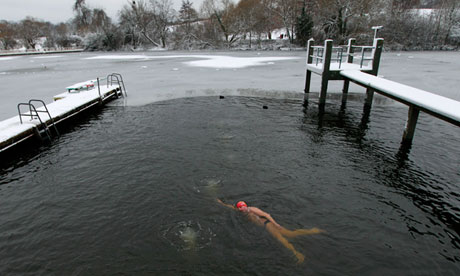
Al Alvarez's swimmer's diary, describing his all-year-round swimming in the outdoor ponds on Hampstead Heath, north London, is a marvellous book. Even the title Pondlife is spot-on: unlaboured, light and right. But it has no business to be as invigorating and absorbing – its success is against the odds. What, after all, are the chances of making a good read out of a repeated activity, in the same place, day in, day out – a record of dips (most of which take place between 2002 and 2009) by an arthritic old man determined to free himself of age in the city's waters? In one sense, the book could not be more repetitive. But I read it as if each swim were a new question – which in a sense it was – and as if I were almost brave enough to take the plunge alongside him. And I never tired of hearing his answers – the sense of each swim as a tonic, a way of being born again.
Alvarez – once the distinguished poetry editor of this newspaper as well as being a writer, poet, poker player and former rock climber – reminds us that the same place is never the same. Like VS Naipaul in The Enigma of Arrival describing repeated walks in Wiltshire, Alvarez is alive to the heath's nuances – the pond the only fixed point throughout the changing year. The casual grace of his writing is partly what makes the journal such a joy to read: "Spring is back again, but pale, tentative, washed out, as though after a binge." I especially enjoyed his wry, neighbourly attitude towards birds – members of his swimming club. He salutes a mannish heron, keeps his eye on hazardous swans, describes Canada geese "ignoring each other, like some ill-matched married couple". He is a sort of water bird himself, although his ankle – a weak point since childhood – is too duff to allow him to be much of a wader.
The diary entries work like a swimmer's rhythmic strokes, pushing ahead through time. In winter, the water can be brutally cold. Oddly enough, just after finishing the book, I was walking on Hampstead Heath – on a punishing January morning – and was able to watch, from a long way off, an old man hesitating at the water's edge. It was obvious that the hesitation was about nerving himself to dive in. I thought of Alvarez and it made me realise I would have liked to hear more about how he learned to psych himself up to swim on the more intimidating days.
My suspicion is that there is some sort of tacit macho rule among outdoor swimmers that makes fear of cold a non-subject. Yet there are times when Alvarez emerges from the water with his teeth and jawbone aching and fingers too numb to do up his trousers or shoelaces. Fortunately, there seems always to be someone on hand to help. And what he does comment on – the only foregone conclusion – is that he feels better after his swim than before: pain temporarily banished. Swimming is also "good for the soul… and cheaper than psychoanalysis".
Swimming is about living in the present and against the tide of age. Inevitably, the book is a reluctant meditation on getting old, although Alvarez does everything he can to ignore it (he is 73 when the book starts, eightysomething by the end). Age is treated no better than it deserves – as a troublesome hanger-on. He chafes against old bufferhood. He could not be clearer about the humiliations involved in not being able to get about easily. He lets us know about them in seething asides. He makes no secret of his vanities – the need for the adrenaline rush involved in overcoming a physical challenge that he once described as "feeding the rat". He wears his faultiness, frustrations and insecurities on his sleeve – or around his ankle.
He describes his loves and hates – his distaste for the literary world ("peopled by monsters") and his unfaltering love on a sudden sighting of his wife: "Forty years on and my heart still jumped with pleasure." He quotes Bette Davis: "Getting old ain't for sissies." And Beckett, who "got it right" when he wrote: "You must go on, I can't go on, I'll go on." His own motto is: "When in doubt, grit your teeth and do it." At one point, battling foul weather, he compares himself to King Lear without the Fool. I would say he is more like King Lear and the Fool together – with all the rash, rueful wisdom that implies.
Alvarez's tenacity is awesome. No wonder that, when he fetches up in Hampstead's Royal Free hospital, he rails against his captivity and gets a boost when his fellow swimmers pitch up with a jam jar of pond water as a gift. He is hanging on to what he calls his "pond cred". He turns 80 and reports feeling that he has arrived at an almost "absurd" destination: "I feel as if I'd been set free to do whatever I want." Even post-stroke, that means swimming. The book's last words are from Pancho Villa: "Don't let me die like this. Tell them I said something clever." Is it really possible he does not know he has?

